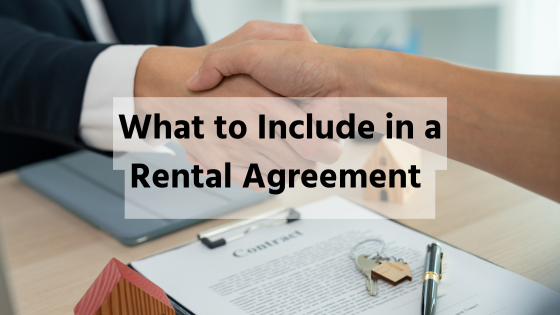What to Include in a Rental Agreement

When renting out property, a well-drafted rental agreement is essential for establishing clear expectations and protecting both parties involved.
A rental agreement is a legal document that outlines the terms and conditions under which a tenant will occupy a landlord’s property.
It is crucial for preventing misunderstandings and legal disputes. A comprehensive rental agreement covers various aspects, including the rent amount, payment schedule, property maintenance responsibilities, and other important clauses.
A rental agreement serves as a binding contract between the landlord and tenant, making it vital to include specific details to avoid conflicts. Without a detailed agreement, landlords might face issues such as missed rent payments, property damage, or legal disputes.
To avoid these problems, landlords should ensure that their rental agreements are thorough and clear.
This guide will outline key elements that should be included in every rental agreement to provide a solid foundation for a successful landlord-tenant relationship. Keep reading to learn more!
Key Elements to Include in a Rental Agreement
Tenant Information
The rental agreement should list the full legal names of all tenants who will be residing in the rental properties, as well as the landlord’s name.

This section clarifies who is responsible for upholding the terms of the lease and who can be held accountable for any breaches.
It also ensures that all individuals living in the property are officially recognized in the agreement, which helps in managing responsibilities and addressing any issues that may arise during the tenancy.
Duration of Tenancy
Define the lease term by specifying the start and end dates of the rental period. A lease can be a fixed-term lease (e.g., one year) or a periodic lease (e.g., month-to-month).
Clearly outline the conditions under which the lease will renew or terminate. For a fixed-term lease, include the exact dates, and for a periodic lease, explain how and when either party can end the agreement.
Rental Payments
Clearly state the amount of rent due, the payment due date, and the acceptable methods of payment.
Include any details about late fees, such as the amount or percentage charged after a certain date, and the consequences of failing to pay rent on time.
By specifying these terms, you help prevent confusion and ensure that both parties understand their financial obligations, which reduces the risk of disputes over payments.
Security Deposits and Fees

Indicate the amount of the security deposit required from the tenant and the conditions under which it may be withheld.
This might include coverage for property damage or unpaid rent. Additionally, specify the timeframe within which the security deposit must be returned after the lease ends, adhering to local regulations. Include any non-refundable fees, such as cleaning fees or application fees.
This section protects both the landlord’s property and the tenant’s rights by clearly outlining financial obligations and expectations.
Maintenance and Repairs
Clearly define the responsibilities for maintaining and repairing various parts of the property. This includes routine maintenance tasks, such as lawn care or changing air filters, and major repairs, such as fixing plumbing issues or electrical problems.
Specify what the tenant is responsible for and what the landlord will handle. Clear delineation of maintenance responsibilities helps prevent disputes and ensures that the property remains in good condition throughout the tenancy.
Occupancy Limits
Indicate the maximum number of people permitted to live in the rental property. This limit ensures that the property is not overcrowded and that it meets local housing regulations.
Including occupancy limits in the rental agreement helps maintain property standards and ensures compliance with health and safety codes.

Access to the Rental Property
Describe the circumstances under which the landlord can enter the rental unit. This includes providing notice for a routine or a walk-through inspection, necessary repairs, or showings.
Outline the notice period required before the landlord can enter, typically 24 to 48 hours, and any exceptions, such as emergency situations where immediate access is needed.
Pet Policy
Clearly define the pet policy for the rental property. This includes whether pets are allowed, any restrictions on the type or number of pets, and any additional fees or deposits required for having pets.
If pets are allowed, outline the rules for pet behavior and care. Including a pet policy helps manage tenant expectations and ensures that the property remains in good condition by addressing potential issues related to pets.
Prohibited Activities
List any activities or behaviors that are not allowed on the rental property. This can include restrictions on smoking, illegal activities, or other behaviors that could damage the property or disturb other tenants.
Clearly outlining prohibited activities helps maintain property standards and ensures that tenants are aware of what is expected of them.
Additional Restrictions
Include any other specific restrictions or rules relevant to the rental property. This might cover things like alterations to the property, the use of common areas, or specific rules for shared facilities.
Additional restrictions ensure that all aspects of property use are clearly defined and agreed upon, helping to avoid misunderstandings and maintain a positive living environment.
By including these key elements in a rental agreement, landlords can create the comprehensive document they need to set clear expectations for both parties.
Bottom Line
In summary, a well-crafted rental agreement is essential for landlords. It establishes clear terms for the rental arrangement, protects both the landlord and tenant, and helps to prevent conflicts.
Including detailed provisions on tenant information, duration of tenancy, rental payments, and other key aspects ensures that all parties understand their rights and responsibilities.
As a professional property management company, IPM Chico is here to help landlords create comprehensive and legally sound rental agreements.
Our expertise ensures that all crucial elements are included and customized to meet your specific needs.
For professional assistance in drafting your rental agreements and managing your properties effectively, contact us at IPM Property Management today. Let us help you ensure a smooth and successful rental experience.
